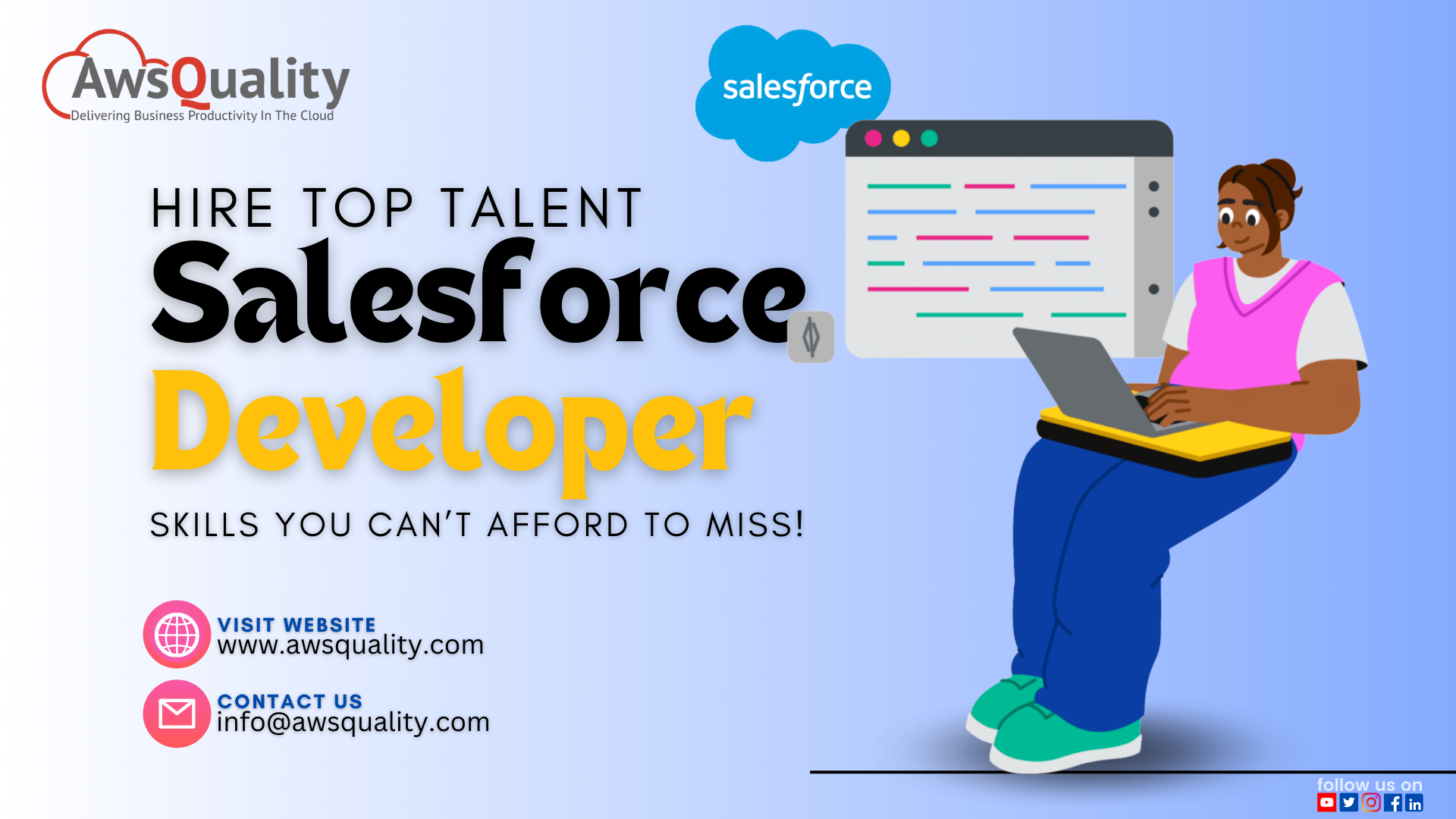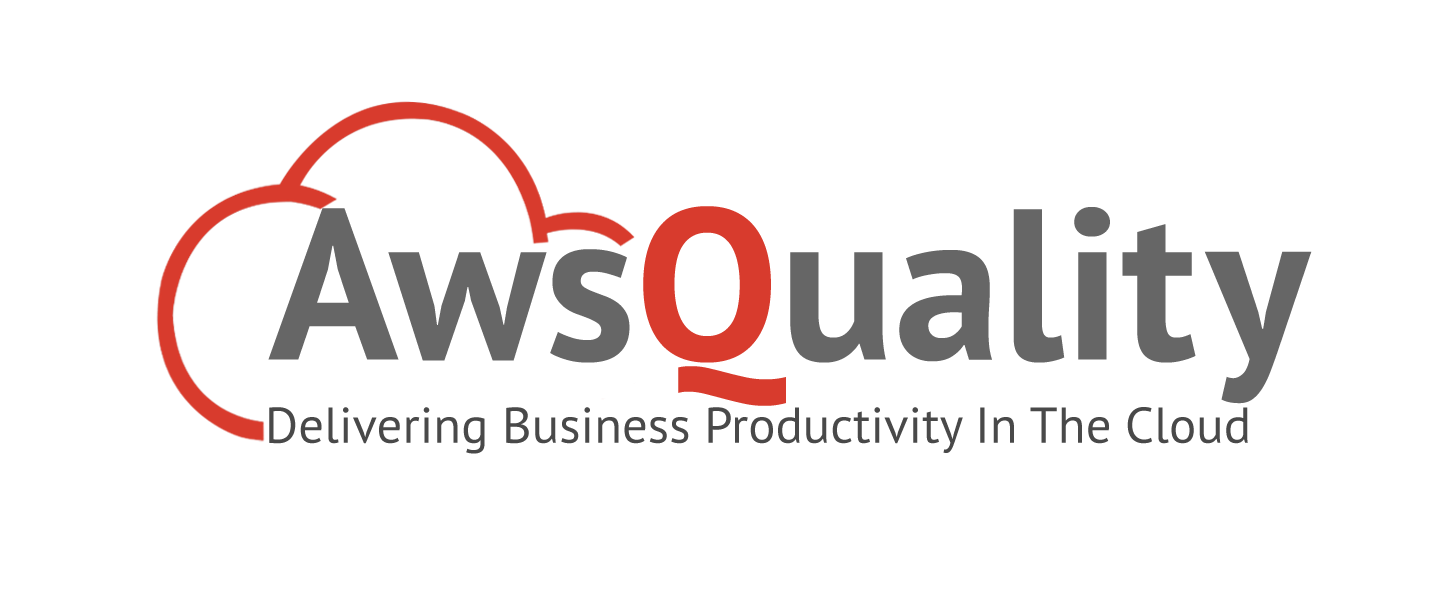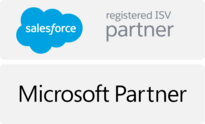
Gaining the necessary abilities can lead to a variety of employment prospects in the rapidly expanding field of Salesforce development, as the demand for Salesforce Developers in this field grows. Knowing what it takes to succeed in Salesforce development is essential if you want to launch or grow your career in this field. This post will go over the necessary abilities, typical hazards to watch out for, and advice to improve your employment prospects. This manual from AwsQuality Technologies, a leading Salesforce Development Company in the USA, can assist you in navigating your route to success whether you’re just getting started or looking to level up.
Crucial Competencies Every Salesforce Developer Must Have
- Administration Skills in Salesforce – It’s crucial to have a firm grasp of Salesforce management before getting into coding. This includes setting up security settings, maintaining user accounts, and modifying the platform to suit the demands of the company. Creating more complex solutions requires a solid understanding of Salesforce’s admin features.
- Programming Skills – Multiple programming languages must be mastered in order to develop Salesforce. Apex is Salesforce’s proprietary language and is required to create bespoke business logic. Another language that is essential is JavaScript, particularly when utilising Lightning Web Components (LWC). You may develop reliable and effective bespoke applications inside the Salesforce ecosystem by becoming proficient in these languages.
- Skillful Interaction – A Salesforce developer frequently serves as an intermediary between business stakeholders and technical teams. The ability to communicate complex technical concepts in comprehensible language is crucial. Proficiency in communicating guarantees that project specifications are comprehended and that the final solutions satisfy corporate requirements.
- Solving Skills for Problems – A large portion of a developer’s work involves troubleshooting. Robust problem-solving abilities are crucial for a variety of tasks, including code debugging, performance optimisation, and creative problem-solving of challenging nature. Always take a scientific approach to problems, and don’t undervalue the importance of a solid set of debugging tools!
- Expertise in the Salesforce Environment – MuleSoft for connectivity, Salesforce DX for development, and several APIs for capability expansion are just a few of the many tools available on the expansive Salesforce platform. Gaining proficiency with these instruments enables you to fully utilise Salesforce’s capabilities and provide all-encompassing solutions that surpass conventional setups.
Typical Traps for Novice Salesforce Developers to Avoid
- Hardcoding IDs – Steer clear of hardcoding record IDs in your code (see Hardcoding IDs ). To store these kinds of values and make your code more flexible and manageable, use custom settings or metadata types.
- Disregarding Bulkification – Since Salesforce is subject to stringent governor limitations, make sure your code is always designed to manage bulk activities. To prevent reaching restrictions and resulting in performance problems, this entails processing several records simultaneously as opposed to one at a time.
- Ignoring Best Practices for Security – Observe Salesforce’s security model at all times. Before executing any data operations, make sure the user has the necessary rights. Also, make sure your code doesn’t unintentionally disclose any sensitive information.
- Ignoring Declarative Solutions – Salesforce offers a plethora of point-and-click tools, such as Process Builder and Flow Builder, that may satisfy the majority of business needs. Investigate declarative solutions first before writing custom code.
- Lack of Documentation – You cannot guarantee that your code is maintainable unless you have adequate documentation. To aid in the understanding of your work by other developers and stakeholders, document your logic, data models, and procedures.
Advice from Skilled Salesforce Programmers
- Steer clear of SOQL queries inside loops. One of the most frequent errors made by novice developers is to nest SOQL queries inside of loops. Governor restrictions may be swiftly reached as a result of this. Instead, keep data in collections and run queries outside of loops.
- Make Use of Salesforce Best Practices – For maximum performance, adhere to Salesforce best practices such as judiciously employing triggers, avoiding hardcoding, and making use of the platform’s built-in capabilities.
- Remain Up to Date with New Features – Three times a year, Salesforce publishes updates. Attend webinars, interact with the community, and read the Salesforce blogs to stay up to date on these developments.
- Involve with the Community – Attending user groups, community forums, and conferences like Dreamforce will help you remain up to date on developing trends and best practices while also offering excellent networking possibilities.
- Ongoing Education – Continue your education and obtain certificates. You can find a lot of materials on platforms like Trailhead to keep up with the most recent Salesforce technology.
Career Prospects: Opportunities and Salary for Salesforce Developers
Particularly in the USA, there is a great demand for Salesforce developers. Recent statistics state that the typical annual compensation for a Salesforce developer is between $90,000 and $120,000. More experienced developers and those with particular knowledge in areas like Salesforce Lightning or integration make even more.
Typical Questions for Salesforce Developer Interviews
Interview preparation can be rather difficult. To get you going, consider the following frequently asked questions:
- What distinguishes Salesforce Lightning from Classic?
2. In your code, how do you address governor limits?
3. Explain the distinction in Salesforce between a position and a profile.
4. How can data integrity be guaranteed in Salesforce?
5. What is the use of custom settings and custom metadata types in Salesforce?
Understanding this will enable you to demonstrate your competence and move through interviews with confidence.
Concluding Remarks
A strong desire to learn new things, along with a combination of technical expertise and great communication abilities, are necessary for success as a Salesforce developer. You may have a fulfilling career in this fast-paced industry by learning the essential skills listed in this guide, avoiding typical mistakes, and remaining active in the Salesforce community.
Available comprehensive Salesforce Consulting Services in the USA from AwsQuality, if you’re wanting to improve your Salesforce Development abilities or recruit exceptional Salesforce professionals. Through specialist solutions and informed guidance, we assist businesses in maximising their Salesforce investments. We are here to support your success whether you are a developer or a company looking for Salesforce knowledge.
Learn more about our offerings or get in contact via email at info@awsquality.com.




